Event Checklist
-
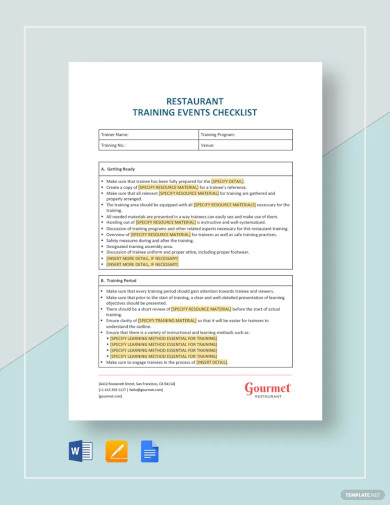
Free Restaurant Training Event Checklist Template
download now -
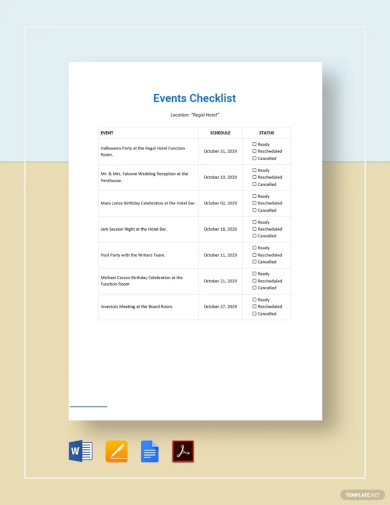
Event Checklist Template
download now -
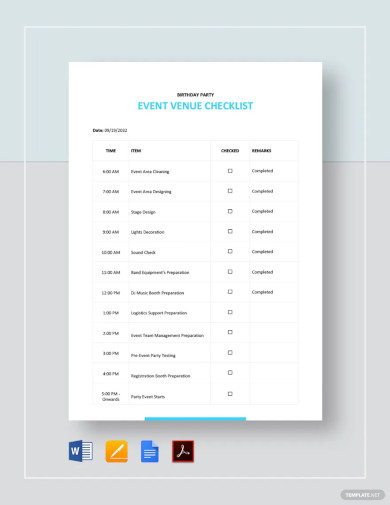
Event Venue Checklist Template
download now -
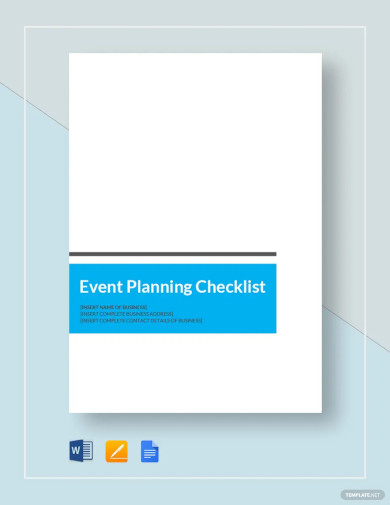
Event Planning Checklist Template
download now -
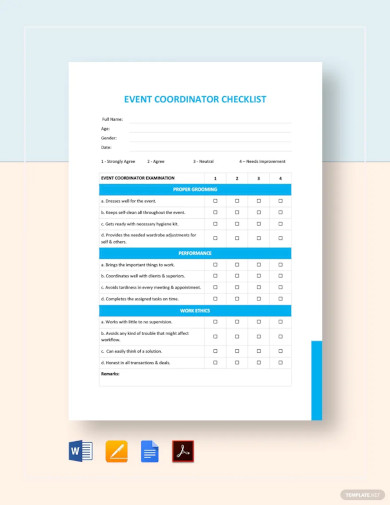
Event Coordinator Checklist Template
download now -
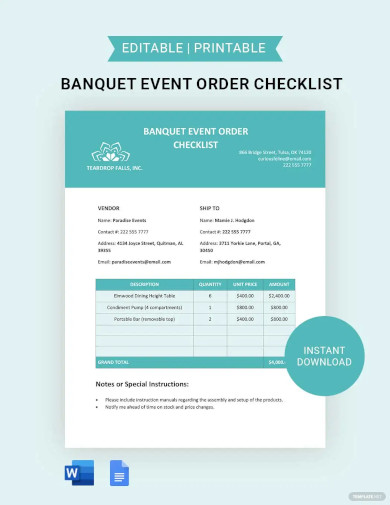
Banquet Event Order Checklist Template
download now -
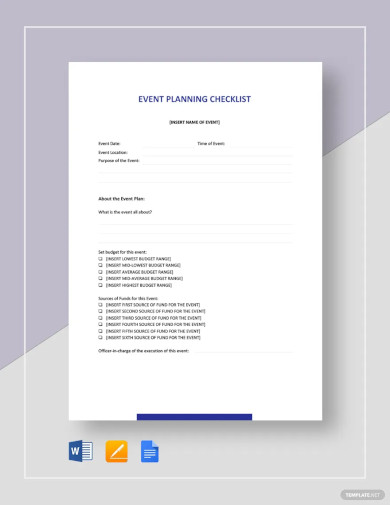
Sample Event Planning Checklist Template
download now -
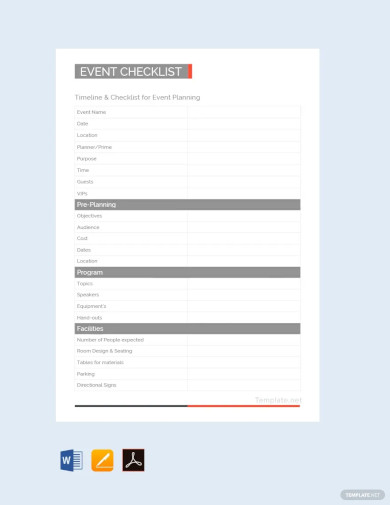
Simple Event Planning Checklist Template
download now -
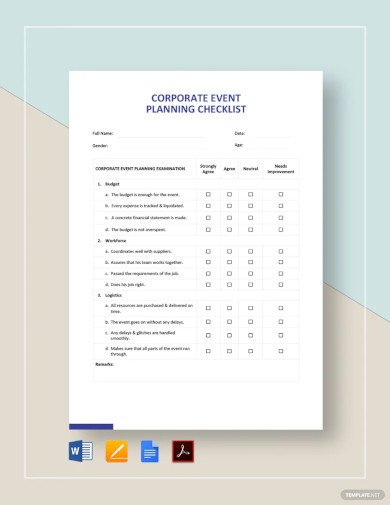
Corporate Event Planning Checklist Template
download now -
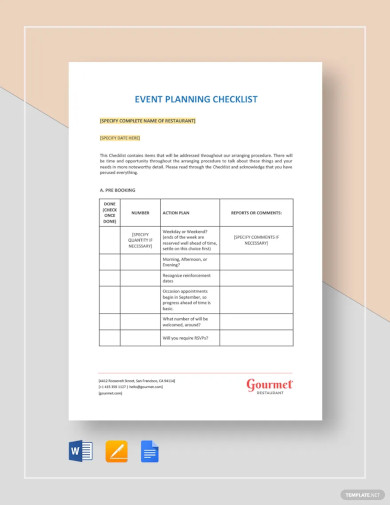
Restaurant Event Planning Checklist Template
download now -
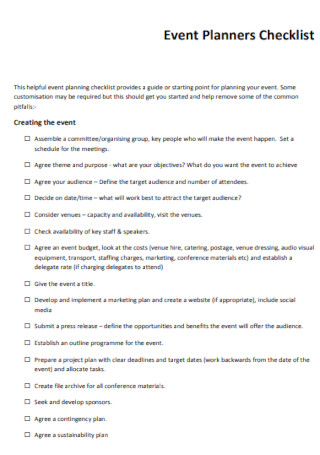
Event Planners Checklist
download now -
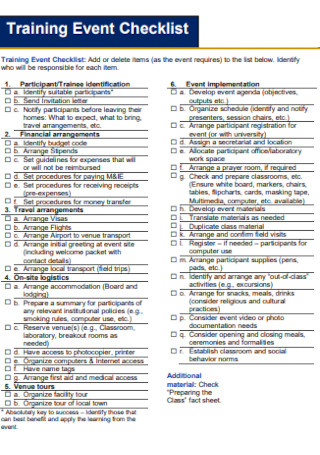
Training Event Checklist
download now -
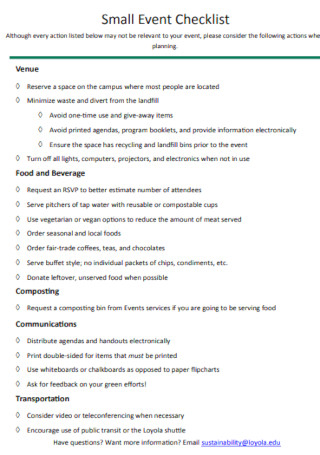
Printable Event Checklist
download now -
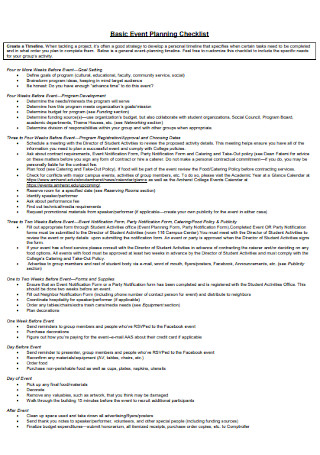
Basic Event Conference Planning Checklist
download now -
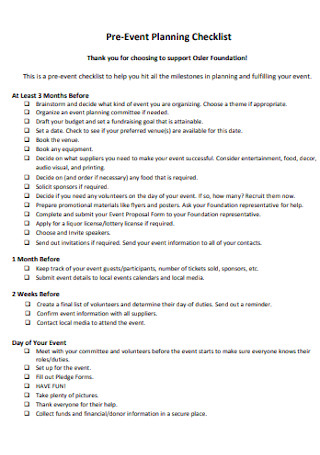
Sample Pre-Event Planning Checklist
download now -
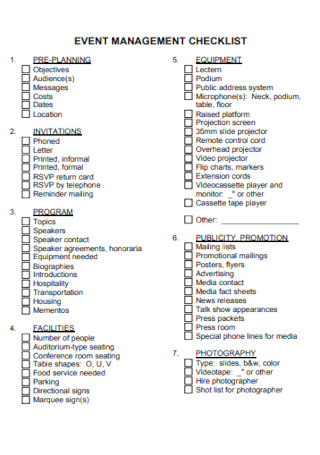
Wedding Event Management Checklist
download now -
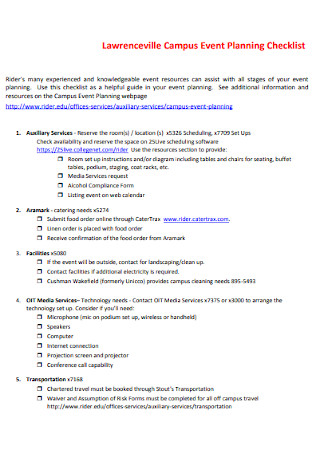
Campus Event Party Planning Checklist
download now -
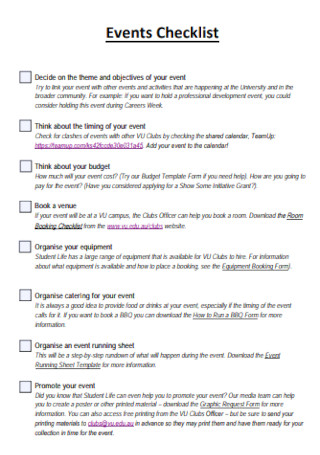
Sample Events Checklist in PDF Example
download now -
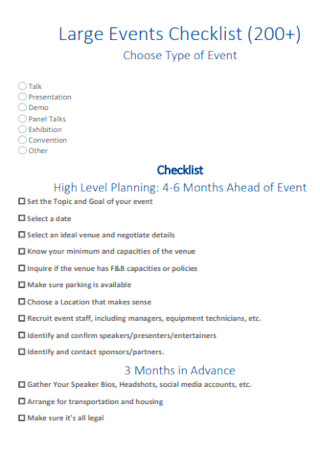
Large Birthday Events Checklist
download now -
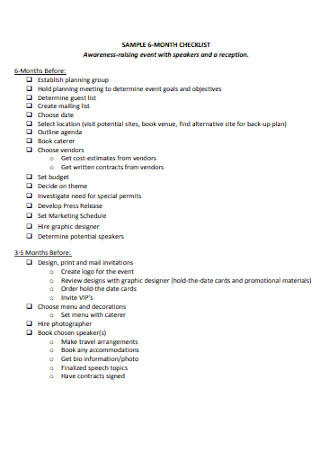
Six Months Event Checklist Form
download now -
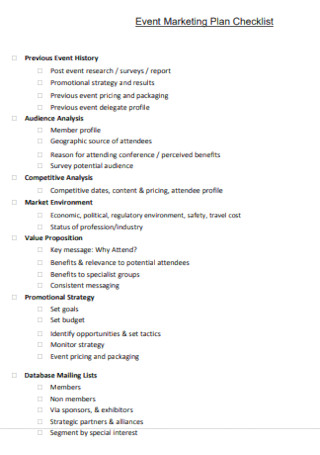
Event Preparation Marketing Plan Checklist
download now -
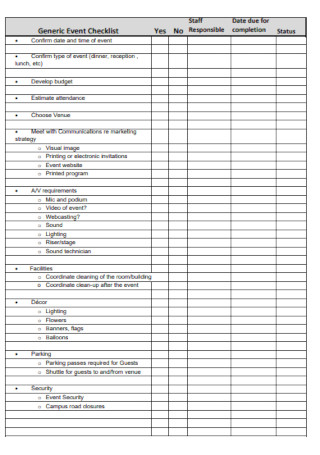
Generic Debut Event Checklist
download now -
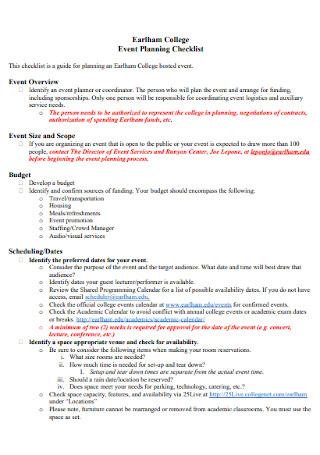
College Event Planning Checklist
download now -

General Event Checklist Template
download now -
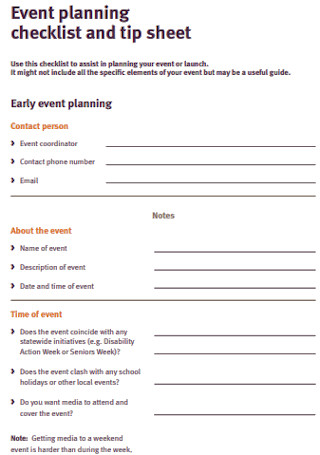
Banquet Event Checklist and Sheet
download now -

Zero Waste Dinner Event Checklist
download now -
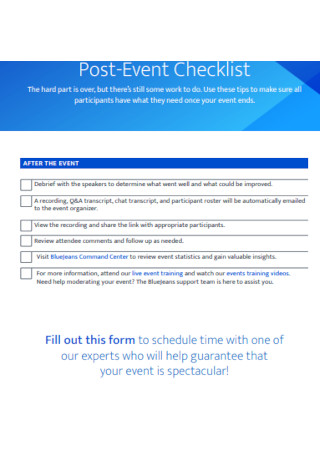
Concert Post Event Checklist
download now -
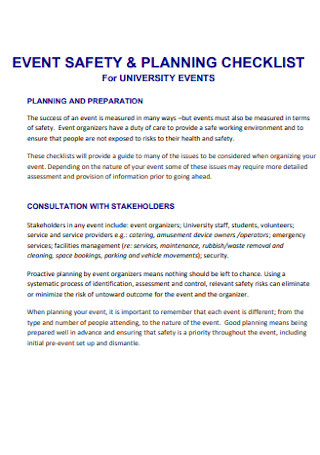
Event Venue Safety and Planning Checklist
download now -
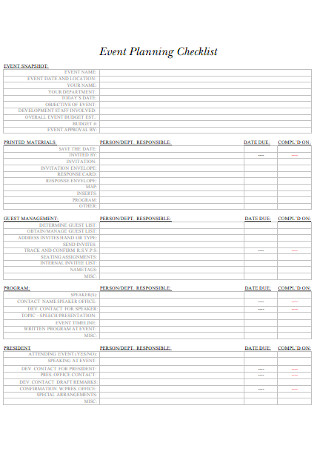
University Seminar Event Planning Checklist
download now -
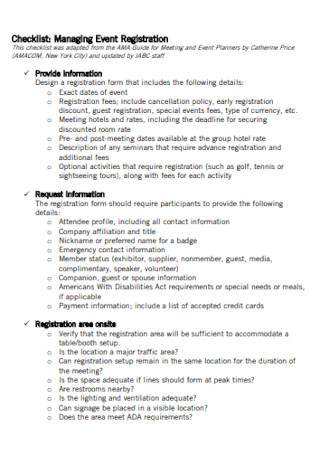
Event Registration Team Building Checklist
download now -
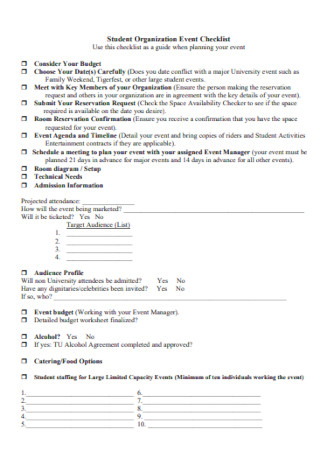
Student Organization Event Launch Checklist
download now -
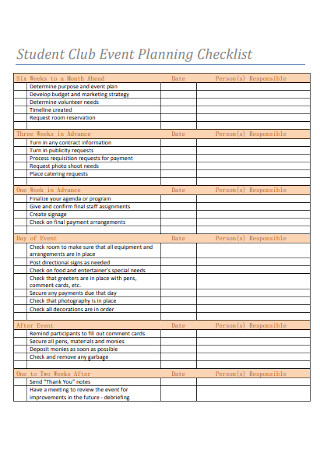
Student Logistics Event Checklist
download now -
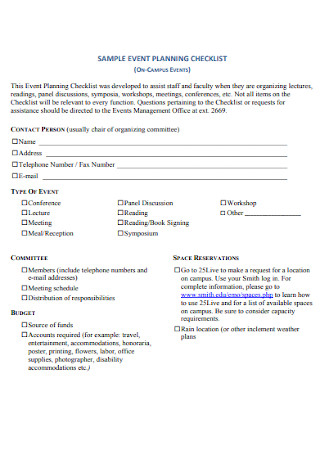
Event Planner Planning Checklist
download now -
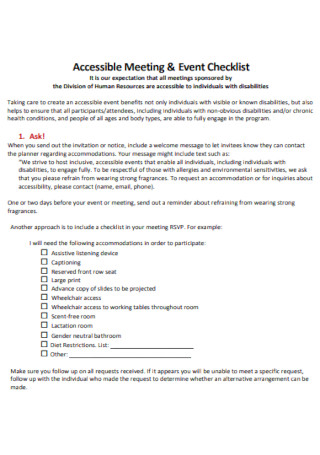
Workshop Event Checklist
download now -
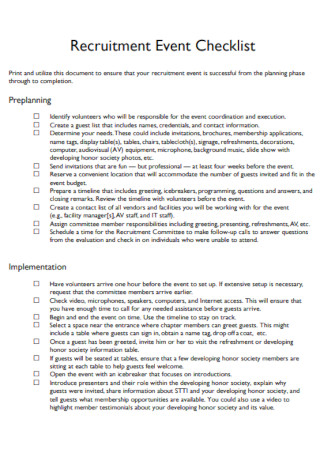
Recruitment Festival Event Checklist
download now -
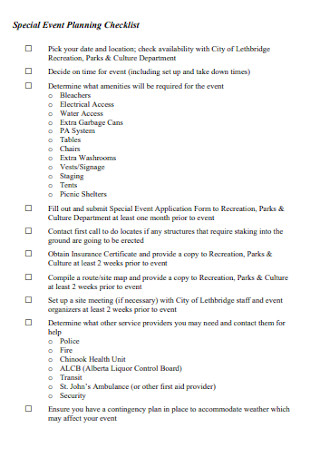
Special Event Planning Checklist
download now -
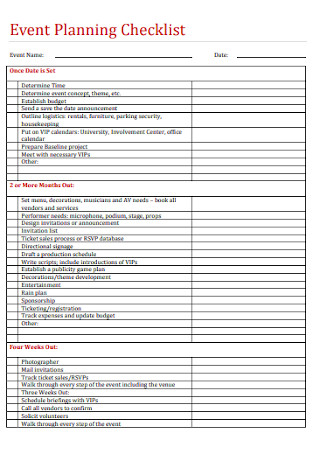
Formal Event Planning Checklist
download now -
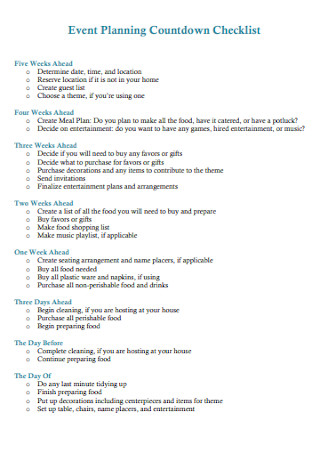
Event Pageant Checklist
download now -
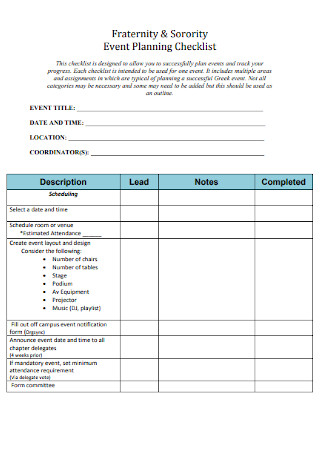
Sorority Event Checklist
download now -
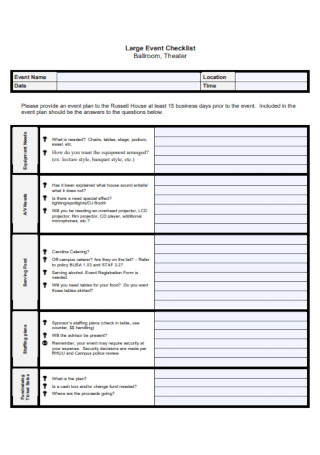
Large Event Checklist
download now -
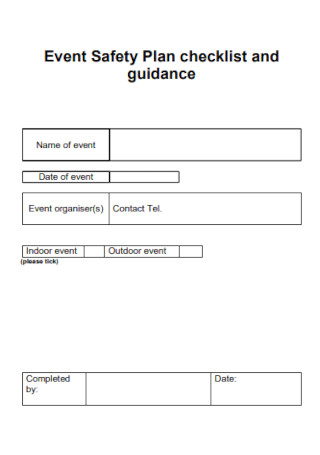
Event Safety Plan Checklist
download now -
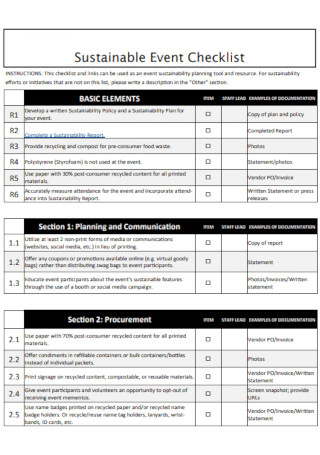
Sustainable Event Checklist
download now -
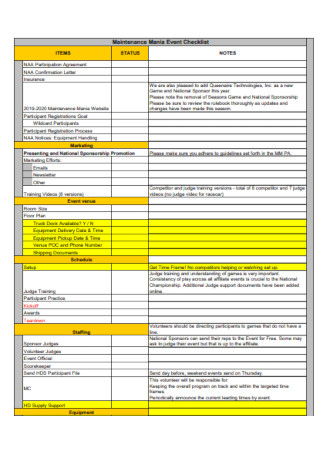
Maintenance Mania Event Checklist
download now -
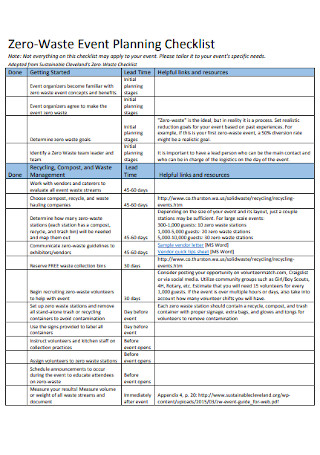
Zero-Waste Event Planning Checklist
download now -
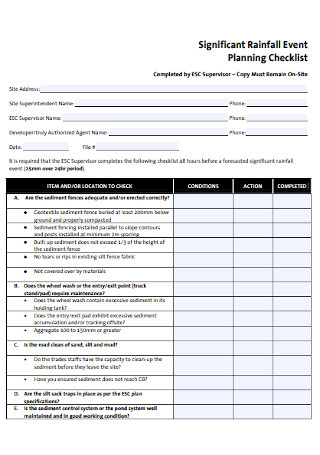
Rainfall Event Checklist
download now -
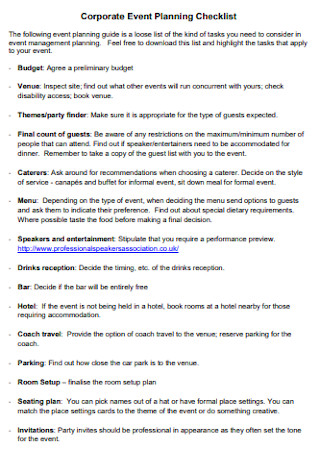
Simple Corporate Event Checklist
download now -
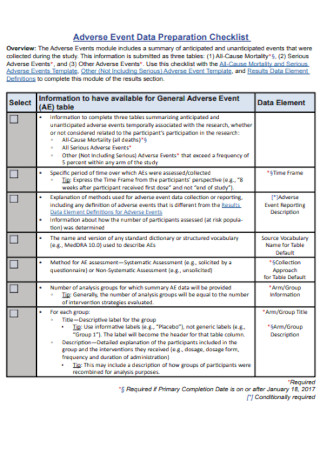
Event Data Preparation Checklist
download now -
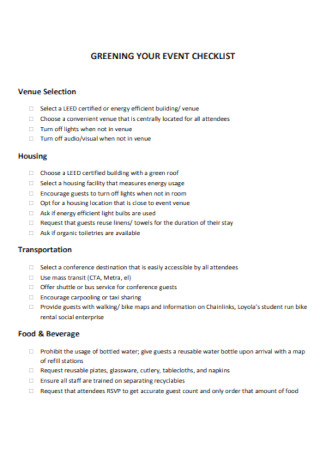
Greening Your Event Checklist
download now -
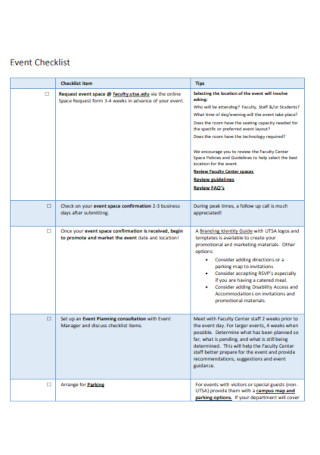
Simple Event Checklist Example
download now -
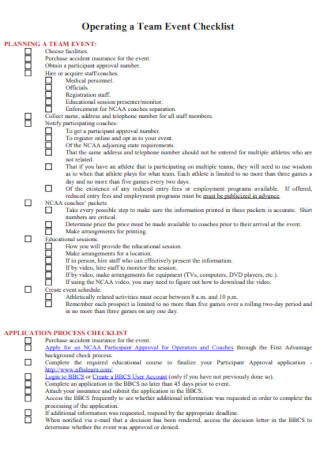
Operating a Team Event Checklist
download now -
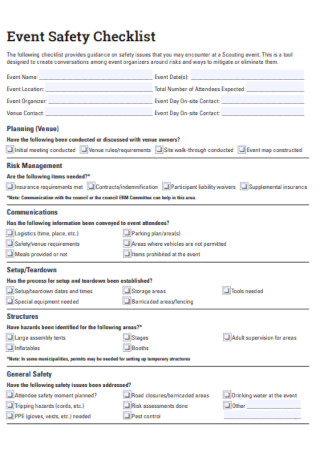
Event Safety Checklist
download now -
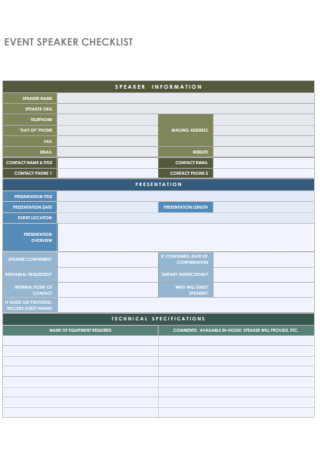
Event Speaker Checklist Template
download now -
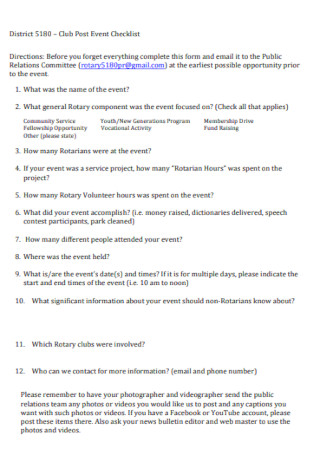
Club Post Event Checklist
download now -
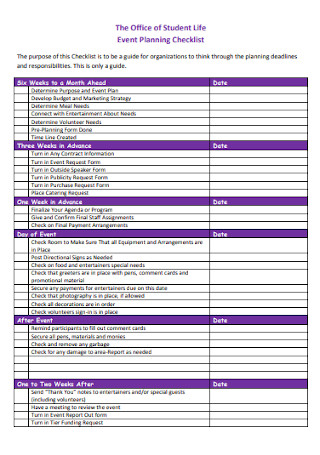
Student Life Event Checklist
download now -
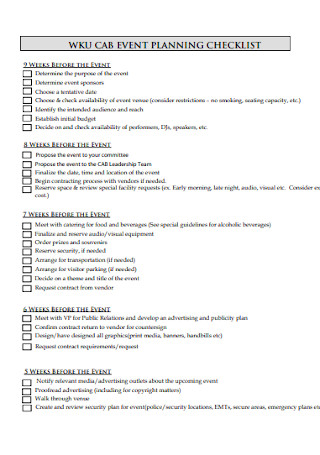
Cab Event Checklist Template
download now -
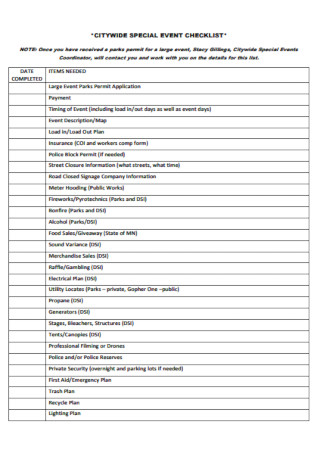
Special Event Checklist
download now -
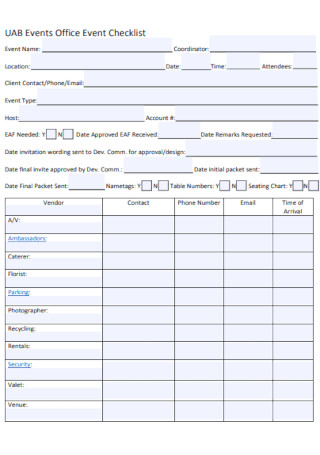
Events Office Event Checklist
download now -
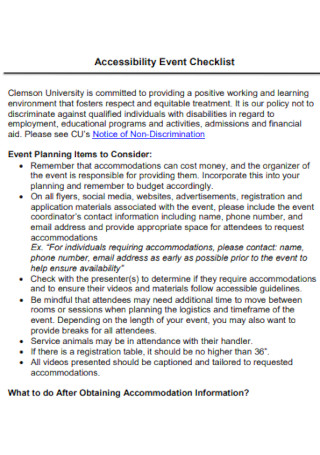
Accessibility Event Checklist
download now -
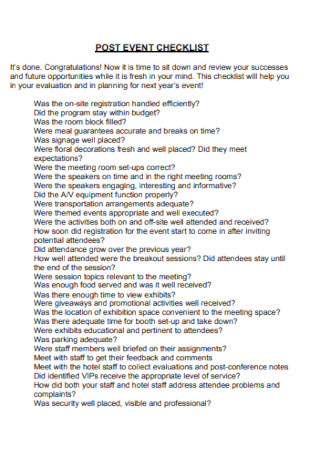
Post Event Checklist
download now -
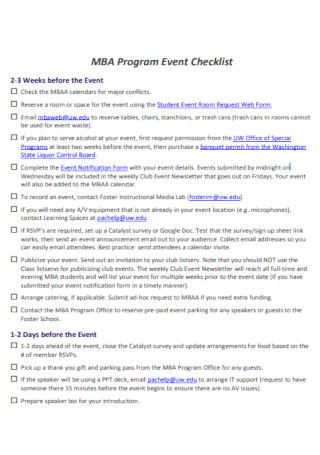
MBA Program Event Checklist
download now -
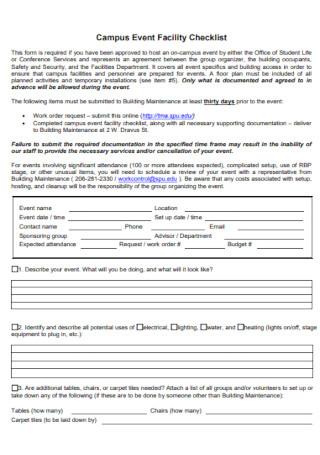
Campus Event Facility Checklist
download now -
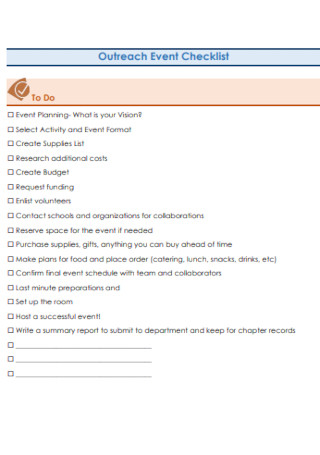
Outreach Event Checklist
download now -
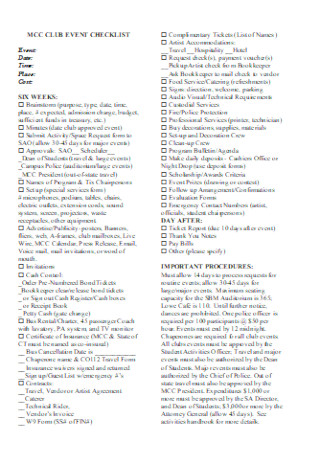
Club Event Checklist Template
download now
FREE Event Checklist s to Download
Event Checklist
Event Checklist: What Is It?
The Important Elements to Note in an Event Checklist
How to Work on an Effective Event Checklist
FAQs
What are the 5 Cs of event management?
How much does an event planner earn?
What are the stages of the event planning process?
What are the major classifications of an event?
Event Checklist: What Is It?
Event preparation tackles many factors—budgeting, food preparation, venue reservation, equipment rental checklist, and more. If you have lots of things to memorize to run an event, don’t make the process any more difficult. Use an event checklist. It refers to the official document that notes the overall process of managing events, down from tradeshows, pageants, conventions, etc. Event planners only need to follow everything written in the list and check every item that has been fulfilled. Planning couldn’t get any easier than that.
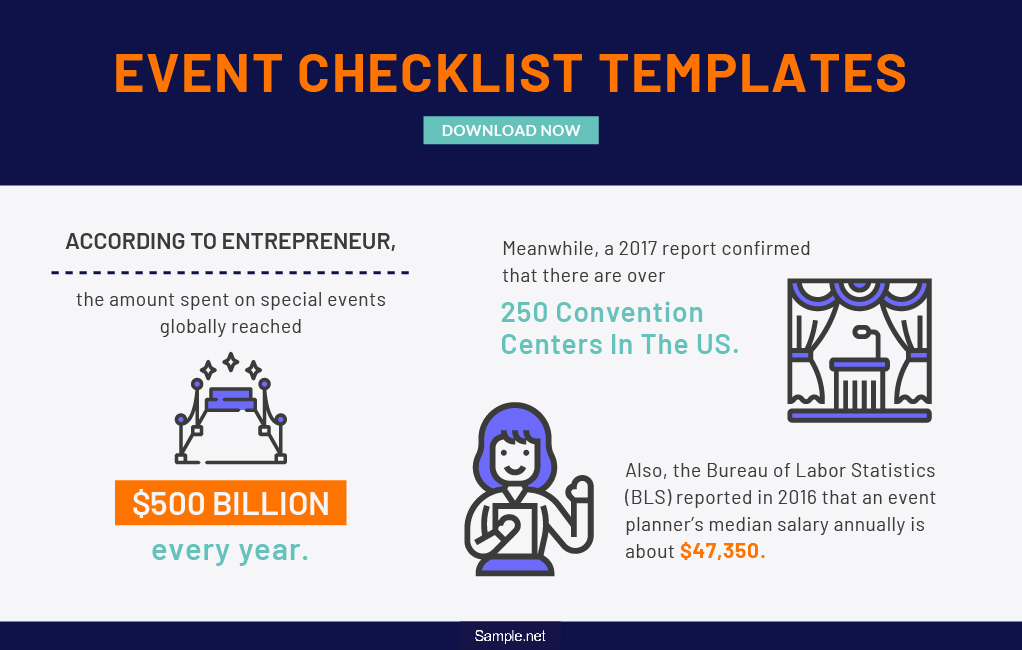
According to Entrepreneur, the amount spent on special events globally reached $500 billion every year.
Meanwhile, a 2017 report confirmed that there are over 250 convention centers in the US.
Also, the Bureau of Labor Statistics (BLS) reported in 2016 that an event planner’s median salary annually is about $47,350.
Why Are Event Checklists Necessary?
Event checklists are necessary to specify all the details to complete an event as planned. Whether you plan a business conference, dining party, or an acting seminar, you can tell that programs have different forms. So you do not just create the same plan for each event. It would help if you customized an event checklist specific to your purpose. What’s more? You can monitor how the progress goes because the event checklist is not only limited as a task checklist; it can also work as an evaluation, budgeting, or preparation checklist. Gone are the days you get confused at dealing with a program since you should have laid out the 411 in the checklist.
The Important Elements to Note in an Event Checklist
It is expected for events to start with brainstorming, where you should determine your event’s purpose, smart goals, resources, and the like. But let us not forget vital elements that cannot be overlooked. Without such components, there might be a chance for your entire checklist to fail. So on your event checklist, be sure to take note of the following important elements:
How to Work on an Effective Event Checklist
You were already introduced to an event checklist, its importance, and its elements. Now from everything you learned earlier, apply them to action by working on your event checklist. As you can see above, there are many sample event checklist templates to choose from. And you can download the best one that fits your choice. After downloading, observe the following steps on how to make an effective event checklist:
Step 1: Finalize the Purpose of the Event
You should know very well about your event ahead if you plan to run a fashion show, sports event, or any. In fact, recognizing your event’s purpose is important since you will layout the event checklist according to that purpose. Your checklist is already wrong if you followed the content and format for fun wedding party plans, yet your goal was supposed to be a formal business meeting minutes. Relevance is key. It would help if you brainstormed about the plans in a draft before writing them on the checklist.
Step 2: List the Tasks and Details in a Template
After you brainstorm ideas and plans for the event, write the tasks and things to fulfill in the event checklist template of your choice. But do not just write without aim because you should input what is relevant for the event only. Can you still recall those elements of an event checklist earlier? Down from the title to the backup plan, make sure you included those in the document. The best part is to edit the template if you wish to add more items, checkboxes, and other designs. Make sure you won’t miss a thing, or the entire program could go wrong.
Step 3: Group the Details to Specific Categories
Good job if you already enlisted all the elements. But it would help if you worked on the organization of your event checklist too. Maybe all data inside were jumbled. A tip is to arrange the details by adding categories. Create specific categories on which items refer to pre-planning, on-the-day checklist, and post-event list. You can also divide the items according to tasks, budget, guest list, etc. Or perhaps, you put numbers to set the sequence of which items must be followed first to last. Whatever your way of organizing is, make sure it makes the event easier to manage rather than turning it difficult.
Step 4: Make a Timeline of the Activities
As we talked about sequence earlier, don’t forget to create a timeline of activities. You can’t tell when certain things will be finished, but you can always estimate how long some tasks take and what time they must be done. If you don’t set a clear schedule, there would be no assurance when certain activities happen. Be sure you made a schedule wherein the activities to do in a day are doable. And most importantly, no time is left wasted since productivity is crucial in event planning. In observing the right order for events, things go smoothly for sure.
FAQs
What are the 5 Cs of event management?
5 Cs of event management guide you in forming an effective and successful event. And they refer to the concept, coordination, control, culmination, and closeout.
How much does an event planner earn?
An event planner’s earnings usually depend on which company he or she worked for. But according to a BLS research survey in 2016, every event planner’s estimated median salary is around $47,350 per year.
What are the stages of the event planning process?
Generally, there are five stages of an event planning process. Each of which helps you reach the kind of success you dreamed of. And the stages are the following:
- Research
- Design
- Planning
- Coordination
- Evaluation
What are the major classifications of an event?
It has been said that events are classified into three major types. Such types are based on an event’s size, type, and context. And those classifications refer to private, corporate, and charity. Make sure you know the type that best suits your event.
Isn’t it exciting to handle event planning, especially for first-timers? That’s true when you have a bunch of creative ideas and strategic plans to offer. But behind the excitement, do not ignore the possible pressure and work incorporated in such tasks. Whether you are a veteran event planner or just on your debut, proper planning for event management is no doubt essential. And with extra help from event checklist templates, expect things to run smoothly until your event is worth remembering.
